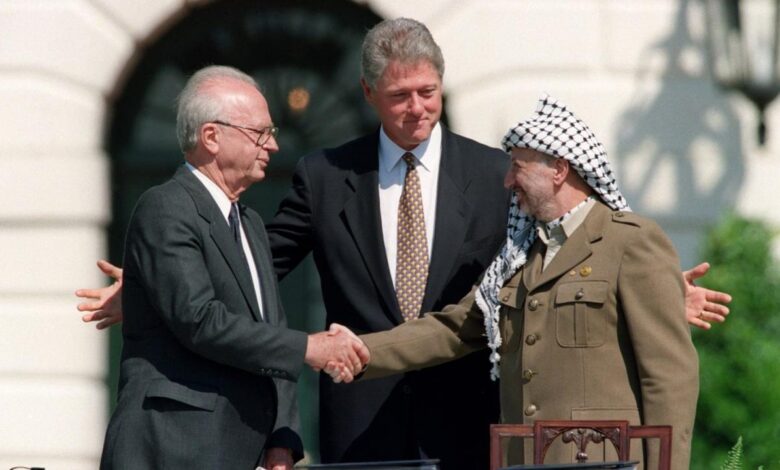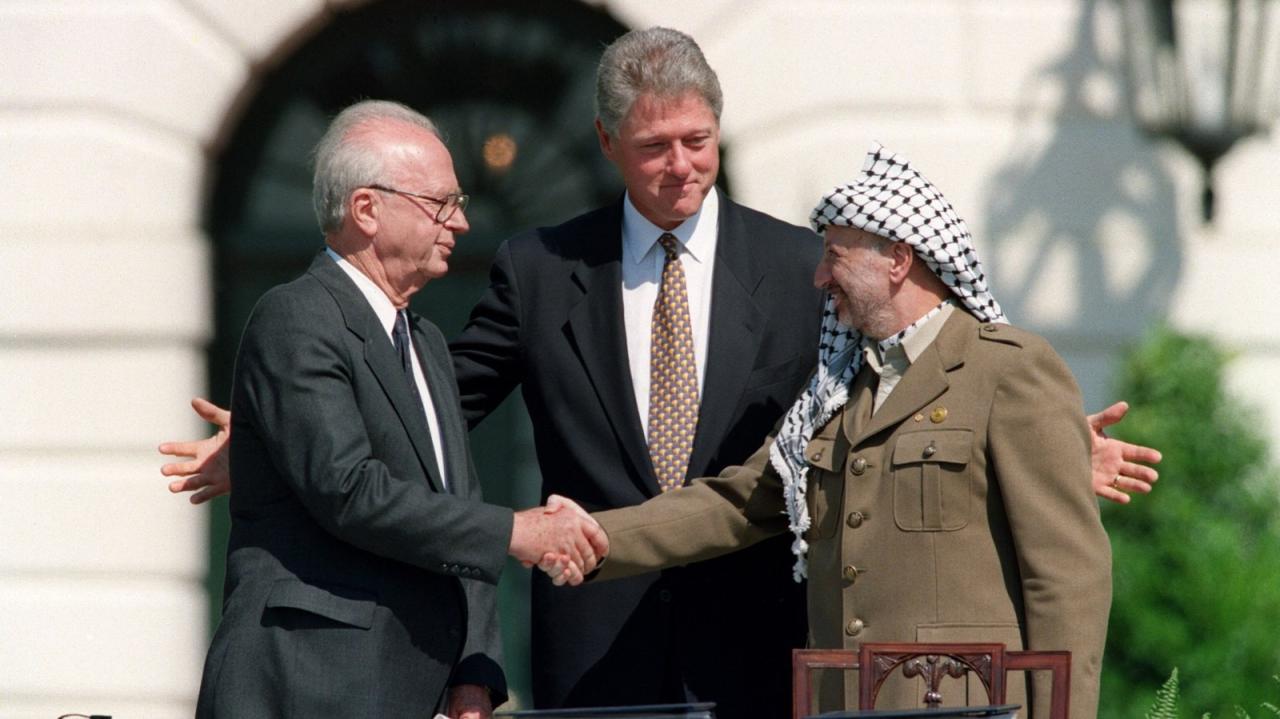
Criticisms of Arafat and Palestinian Leadership: A Complex Legacy
Criticisms of Arafat and Palestinian leadership have been a recurring theme throughout the Israeli-Palestinian conflict. Yasser Arafat, the iconic figure who led the Palestinian Liberation Organization (PLO) and later the Palestinian Authority, remains both revered and controversial. His leadership style, decisions, and the Palestinian Authority’s internal challenges have been subject to scrutiny, sparking debate about the effectiveness of their approach to achieving Palestinian self-determination.
This examination delves into the complex dynamics of Arafat’s leadership, exploring his strengths and weaknesses, the internal struggles of the Palestinian Authority, and the impact of external influences on their ability to navigate the tumultuous landscape of the Middle East.
We will analyze the Palestinian leadership’s approach to negotiations with Israel, their record on human rights, and the role of other Palestinian factions in shaping the political landscape.
Human Rights and Social Issues: Criticisms Of Arafat And Palestinian Leadership

The Palestinian leadership’s record on human rights and its approach to addressing social issues have been subject to considerable scrutiny and criticism. This section examines these criticisms, exploring allegations of corruption, abuse of power, and suppression of dissent, as well as the leadership’s strategies for tackling poverty, unemployment, and education.
It also investigates the role of civil society organizations in advocating for human rights and social justice within the Palestinian territories.
Criticisms of the Palestinian Leadership’s Human Rights Record
The Palestinian leadership has faced accusations of corruption, abuse of power, and suppression of dissent. These allegations have raised concerns about the respect for human rights within the Palestinian territories.
- Corruption:Transparency International’s Corruption Perceptions Index consistently ranks the Palestinian Authority (PA) low, indicating widespread corruption. This has led to accusations that public funds are being misappropriated and that the leadership is enriching itself at the expense of the Palestinian people.
- Abuse of Power:There have been reports of arbitrary arrests, detention without trial, and torture by Palestinian security forces. These practices have been condemned by human rights organizations, who argue that they violate fundamental human rights principles.
- Suppression of Dissent:The PA has been criticized for cracking down on political opponents and restricting freedom of speech and assembly. This has created an environment of fear and intimidation, where dissenting voices are silenced and critical views are discouraged.
The Palestinian Leadership’s Approach to Social Issues
The Palestinian leadership has faced significant challenges in addressing social issues such as poverty, unemployment, and education. The ongoing conflict with Israel, coupled with political instability and economic constraints, has exacerbated these problems.
- Poverty:The Palestinian territories have high poverty rates, with a significant portion of the population living below the poverty line. The PA has implemented various social programs aimed at alleviating poverty, but these have often been insufficient and ineffective.
- Unemployment:Unemployment rates in the Palestinian territories are among the highest in the world. This is partly due to the Israeli occupation, which restricts economic activity and limits job opportunities. The PA has struggled to create jobs and stimulate economic growth.
- Education:Education is a priority for the Palestinian leadership, but the education system faces challenges such as limited resources, overcrowding, and a shortage of qualified teachers. The conflict with Israel has also disrupted education, with schools often being closed or damaged during military operations.
The Role of Civil Society Organizations
Civil society organizations play a crucial role in advocating for human rights and social justice within the Palestinian territories. They provide essential services, such as healthcare, education, and legal aid, and they work to hold the Palestinian leadership accountable for its actions.
- Human Rights Advocacy:Civil society organizations monitor human rights violations and document abuses by both the Palestinian leadership and the Israeli authorities. They also advocate for legal reforms and policy changes to protect human rights.
- Social Justice Initiatives:Civil society organizations work to address social issues such as poverty, unemployment, and inequality. They provide essential services to vulnerable populations and promote social inclusion and economic development.
- Accountability and Transparency:Civil society organizations play a vital role in holding the Palestinian leadership accountable for its actions. They conduct investigations, publish reports, and raise public awareness about corruption, abuse of power, and human rights violations.
The Role of Hamas and Other Palestinian Factions

The Palestinian political landscape is complex and fragmented, with various factions vying for power and influence. Among these, Hamas stands out as a prominent force, alongside other groups that have shaped the Palestinian struggle for self-determination. Understanding the relationships and dynamics between these factions is crucial for comprehending the challenges faced by the Palestinian leadership in governing and negotiating with Israel.
Relationship Between the Palestinian Authority and Hamas, Criticisms of arafat and palestinian leadership
The relationship between the Palestinian Authority (PA), led by Fatah, and Hamas has been marked by both cooperation and conflict. Following the 2006 Palestinian legislative elections, Hamas emerged victorious, leading to a power struggle with Fatah that culminated in the 2007 Hamas takeover of Gaza.
This division has had a significant impact on the Palestinian political scene, creating a de facto separation between the West Bank and Gaza. Despite the ongoing division, there have been periods of cooperation, particularly in areas of mutual interest such as humanitarian aid and economic development.
For example, in 2014, the PA and Hamas reached a reconciliation agreement aimed at forming a unity government. However, this agreement was short-lived and the two factions remain deeply divided.
Impact of Other Palestinian Factions
The Palestinian political landscape is further complicated by the presence of other factions, such as the Popular Front for the Liberation of Palestine (PFLP), the Democratic Front for the Liberation of Palestine (DFLP), and the Palestinian People’s Party (PPP). These groups have different ideologies and strategies, ranging from armed struggle to peaceful resistance.
The presence of these factions can pose challenges to the PA’s ability to govern effectively and negotiate with Israel. For instance, the PFLP, which is considered a more radical group, has carried out attacks against Israeli targets, often leading to tensions with the PA.
Additionally, the presence of multiple factions can complicate efforts to build a unified Palestinian front, making it difficult to achieve consensus on key issues such as negotiations with Israel.
Potential for a Unified Palestinian Leadership
The potential for a unified Palestinian leadership that can represent all factions is a complex and challenging issue. Achieving unity requires addressing the deep divisions and mistrust between factions, as well as finding common ground on key issues such as the future of the Palestinian state, the role of armed struggle, and the relationship with Israel.
However, the possibility of a unified leadership remains a critical aspiration for many Palestinians.
The criticisms of Arafat and the Palestinian leadership often centered around their perceived lack of transparency and accountability. These criticisms, however, echo the global sentiment against powerful institutions, as seen in the IMF and World Bank protests in Washington DC.
The protests, while seemingly unrelated, highlight a shared desire for greater transparency and a fairer distribution of power, which is a crucial aspect of the ongoing debate surrounding Palestinian leadership.
Arafat and the Palestinian leadership faced intense criticism for their handling of various issues, including the peace process and internal conflicts. The complexities of the Palestinian struggle, however, often overshadowed the broader context of global injustices. One stark example is the way pharmaceutical corporations have profited from the AIDS crisis in Africa, a situation rife with exploitation and profiteering.
Similarly, criticisms of Arafat and the Palestinian leadership often neglected the systemic inequalities and global power dynamics that continue to shape their reality.
The criticisms of Yasser Arafat and the Palestinian leadership often centered around perceived corruption, lack of transparency, and the failure to achieve a lasting peace agreement. These criticisms were further amplified by the Israeli government, who saw the Palestinian leadership as an obstacle to peace.
It’s worth noting that the establishment of the International Criminal Court in 2002 was a significant development in the international legal landscape, which has raised concerns about potential implications for Palestinian leaders in the context of the ongoing Israeli-Palestinian conflict.

